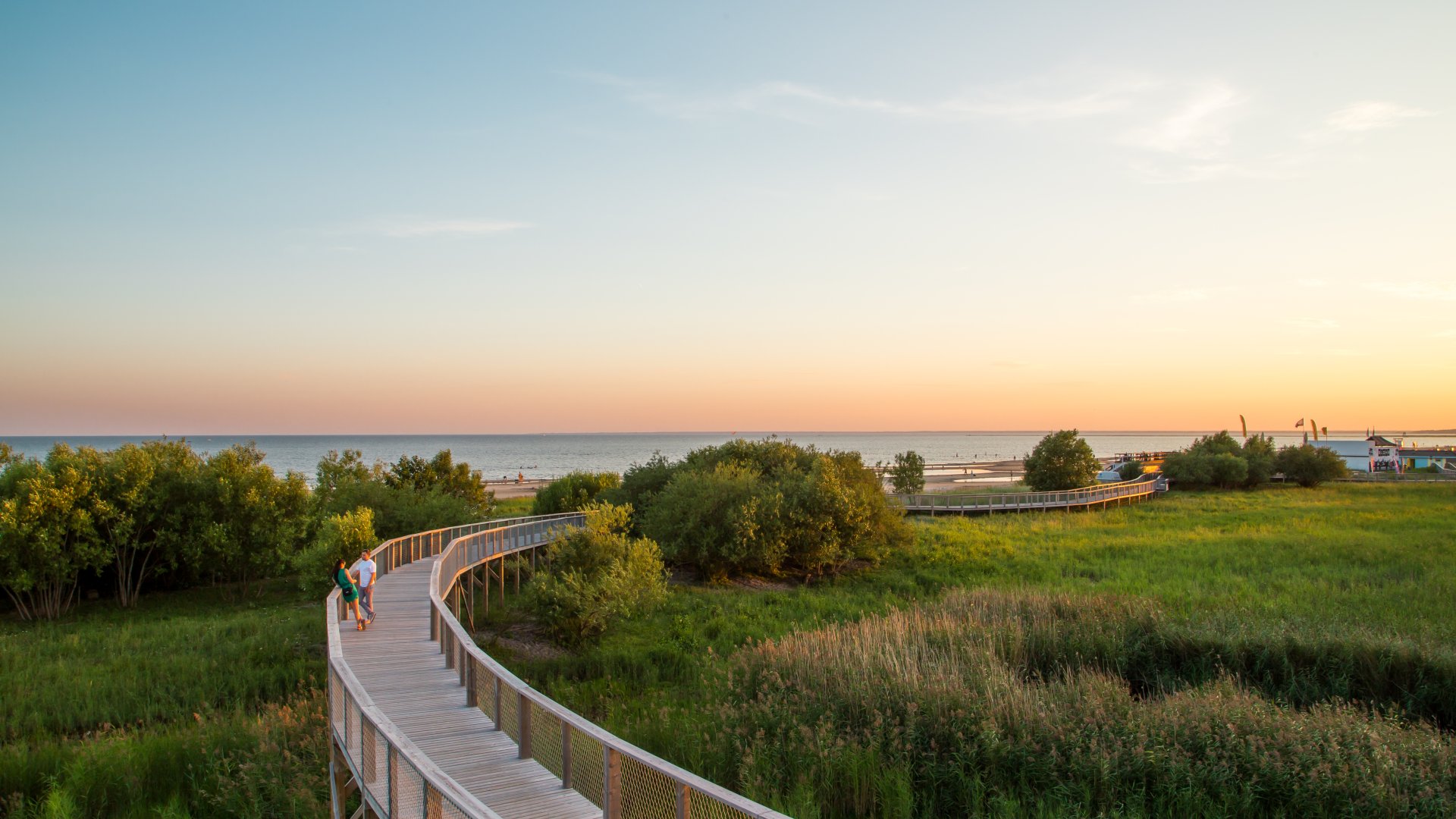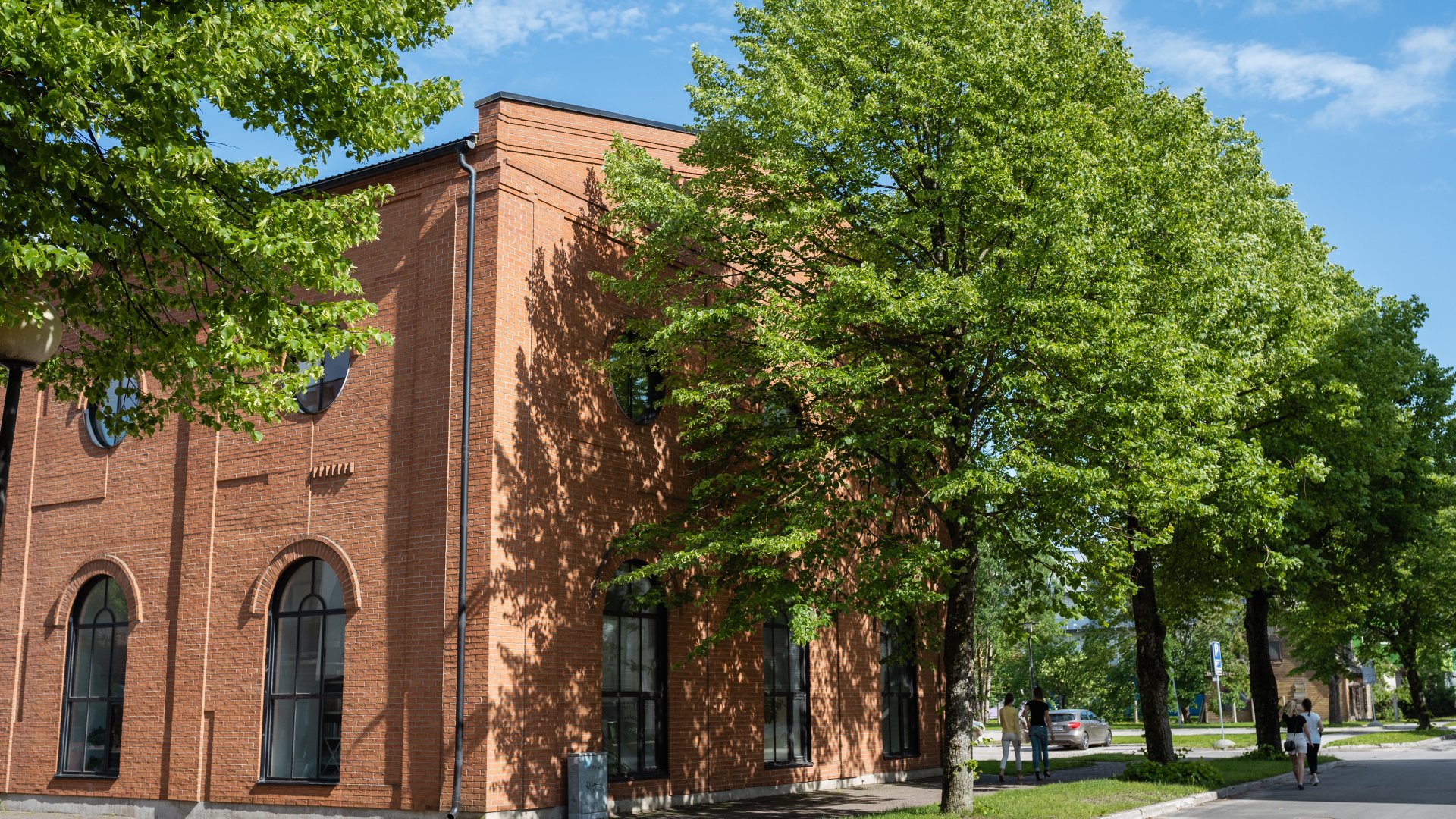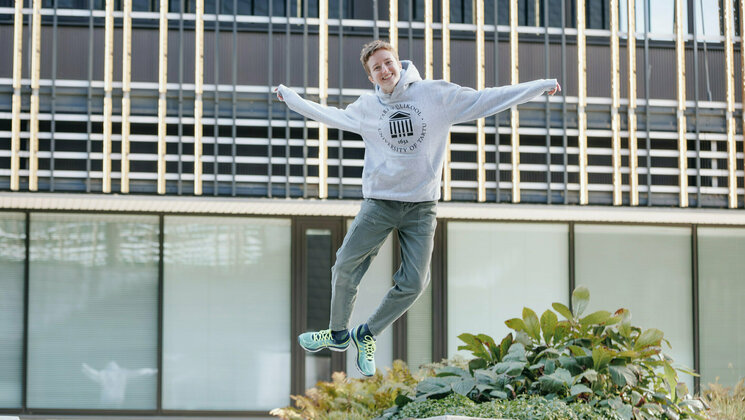Wellness and Spa Service Design and Management
Master's
The programme will not admit students for autumn 2025. Please check this website for future announcements.
- The University of Tartu belongs to the top 350 of the world's universities (see Rankings and Surveys).
- 95% of studies are conducted online. In-person studies take place in Pärnu, a member of the European Spas Association and an internationally acclaimed health tourism destination with more than 175 years of history as a resort town.
- Small group dynamics and learning allows direct interaction and discussions with lecturers.
- Internationally respected professors and lecturers from Hungary, the UK, Finland, Lithuania, and Estonia teach the programme.
- After graduation, you can start your own business or manage the world's top spas, wellness centres, resorts, treatment centres and other hospitality and health-related facilities.
Did you know the global wellness economy is valued at $4.4 trillion? Did you also know that wellness is one of the fastest-growing industries globally? Do you see yourself working in the wellness industry and contributing to people's health? Join our international master's programme in Wellness and Spa Service Design and Management!
You will know and understand theoretical aspects, best practices and future wellness and spa management trends and related issues required for the successful management of such businesses and the well-being of people and society.
You will develop a service-oriented mentality and acquire those professional skills needed for working within wellness, spa and related organisations and businesses, in particular, to:
- plan and develop strategic, operational and human resource management and marketing of wellness and spa organisations and enterprises;
- design attractive, innovative and competitive wellness and spa services;
- manage wellness and spa service quality and environmental and sustainability issues.
The studies are mainly online (seminars, independent studying). Still, there will also be intensive in-person studies at the beginning of the first year when we meet in Pärnu. This part will take approximately 2 to 4 weeks.
While you will study mainly online, you are also welcome to move to Estonia. As an international student of the University of Tartu, you can apply for a residence permit for study. You can, for example, live in the capital, Tallinn, but come to Pärnu to use our comfortable library or participate in the college's events.
Programme highlights in video
- Watch the presentation about International master's admissions by the Head of International Admissions during Virtual Open Day 2024.
From autumn 2024, the master's programme in Wellness and Spa Service Design and Management is taught mostly online. At the beginning of the first semester, students will come to Pärnu for up to four weeks; then, studies are conducted online. Additional trips to Estonia will be decided with the group during the studies.
Online studies are planned for every other week from Monday to Wednesday.
The curriculum consists of 5 modules. The wellness and spa topics connect all of them.
During the first year, four modules are being taught (each semester two), and there is only one module in the third semester. We also provide courses that help students write their thesis and finish their studies.
During their studies, students can study abroad or do an internship with an Erasmus grant.
Modules and courses from autumn 2024
The master's programme in Wellness and Spa Service Design and Management will be divided into six modules:
1. Foundation of Wellness:
- Wellness Philosophy and Self-Development
- Spa Nutrition and Global Food Trends
- Future Trends in Technology and Economics
- Online and Group Cooperation
2. Wellness Service Design:
- Wellness and Spa Services
- Service design
- Wellness Economics and Entrepreneurship
3. Management and Leadership:
- Process and Project Management in Service Design
- Strategic Management
- Management of Wellness Organisations
4. Digital Marketing and Communication:
- Digital Marketing in Tourism
- Visual Communication Design
- Digital Well-Being
5. Integral Destination Development:
- Sustainable Development and Wellness
- Wellness and Health Tourism
- Regenerative Tourism
- Destination Management
6. Master’s Thesis or Exam:
- Master's Thesis
- Research Methodology
- Data Analysis
- Master's Seminar
- Internship
The internship is compulsory and an essential part of the whole study process. The most favourable time for this is the summer period from June until September after the second semester. Students have acquired enough theoretical knowledge by then and passed the main study modules necessary to understand better spa and wellness philosophy, services, and industry in general.
It is the student’s responsibility to find an internship place. However, we have an internship specialist who will guide you through the process and help with the search.
In the first semester, the students are provided with information about the internship process they must go through to be ready on time. All arrangements, negotiations and agreements take time; therefore, it is never too early to start planning. Some students have a very clear idea of where they want to work, but others may need some help.
The responsibilities of each student will be discussed, tasks described and agreed upon with both parties and contracts signed before the start of the internship period. Every student will have a supervisor, the primary support and contact in the enterprise during the internship.
Usually, our students find a position as a spa attendant or a receptionist in a spa, wellness centre or spa hotel. Sometimes, our students work as assistants to spa managers, which means getting involved in spa operations, marketing and product development.
Students have to record their activities and write a report at the end of the internship period. The written report must be submitted and defended at the college the following semester. You must reflect on your work experience and share it with your fellow students, get feedback and discuss the details with our specialist when you return.
Erasmus
The students of the University of Tartu have the right to apply for an ERASMUS scholarship, which means financial internship support to help cover travel costs and accommodation during the working period. It is very helpful and handy to have your costs under control. With our internship specialist, you will learn about your rights and options. Usually, personal appointments are scheduled for discussion.
Our students have done their internships, for example in Thermen Bussloo (Holland), Ajwa Hotels (Turkey), Forest Essentials (India), Kempinski Summerland Hotel & Resort (Lebanon), Aegeo Spas (Greece), Hotel Arts Barcelona (Spain), and in Estonia, for example, Radisson Collection Hotel Tallinn, Wasa Resort, Tallink Spa & Conference Hotel, Hilton Tallinn Park.
Course and module details
This programme structure is the latest one confirmed by the university. Next year's modules will be updated by 15 April. Significant changes to the programme will be announced in advance on this website. Check the Study Information System for the latest updates.
Curriculum version:
More info: Study Information System
Pärnu College
The Pärnu College, one of the University of Tartu's three colleges, is located in Pärnu, the Summer Capital of Estonia. It is the flagship of service management education in Estonia. The college offers top-quality higher education as part of the University of Tartu, promotes service economy in Estonia in entrepreneurship, tourism and social affairs, and maintains and develops academic traditions in western Estonia.
The University of Tartu Pärnu College is the most experienced tourism education provider in Estonia and the only place in Europe where you can get a master's degree in Wellness and Spa Management.
Read more about the college here.
People
Internationally respected professors and lecturers from the USA, Hungary, France, UK, Finland, and Estonia teach the Wellness and Spa Service Design and Management master's programme:
- Laszlo Puczko, PhD, Visiting Professor (Hungary)
- Margrit Kärp, MBA, Junior Lecturer in Spa Management
- Melanie Smith, PhD, Visiting Associate Professor, University of Tartu Pärnu College
- Monika Kumm, PhD, Senior Research Fellow, University of Tartu Pärnu College
- Marit Piirman, PhD student, Junior Lecturer in Tourism Services, University of Tartu Pärnu College
- Anne Roosipõld, PhD, Associate Professor of Tourism Services, University of Tartu Pärnu College
- Ilona Beliatskaya, PhD student, Visiting lecturer, Estonian Business School
- Mario Passos Ascencao, PhD, Visiting Lecturer, Haaga-Helia University of Applied Sciences
- Getter Koobas, Coordinator of Student’s Practical Training, University of Tartu Pärnu College
- Ly Lumiste, Erasmus Programme Coordinator, University of Tartu Pärnu College

The first weeks of the studies take place in Pärnu, the Summer Capital of Estonia. Pärnu has 185 years of longstanding traditions in health resorts and hospitality and is an internationally acclaimed health tourism destination with the European Spa Association membership. It is located 1.5 hours from Tallinn, the capital of Estonia, and 2.5 hours from Riga, the capital of Latvia. Pärnu is a beautiful and peaceful place to study and live, with plenty of varied activities such as sports, entertainment and cultural events, set in a natural environment close to beaches and forests.

Visit Pärnu and the college virtually
Explore Pärnu and the University of Tartu Pärnu College through the university's virtual tour.
After graduation, you are qualified to work at top spas and wellness centres worldwide and build a successful career as a spa manager or wellness expert or start your own business.
Admission requirements for Wellness and Spa Service Design and Management
- bachelor’s degree or equivalent qualification (must be obtained by the end of July) – please see our country-specific document requirements.
- English language proficiency – see our acceptable tests and exempt categories.
NB! The restrictions for the citizens of the Russian Federation are specified here.
Applications are evaluated based on
- the score of the essay (yields 50% of the final score)
- the admission interview (yields 50% of the final score)
The essay consists of 4 parts.
In the first part, candidate describes his/her previous studies and work experience
In the second part, the candidate describes his/her motivation and interests in studying in master’s programme.
In the third part, he/she describes what are his/her goals for studies in the master’s and explains what are the research and practical problems, which he/she wishes to deal with during the studies. Candidate proposes a possible topic for his/her master’s thesis. The topic has to be related to actual problems in wellness and spa sector.
In the last part, the candidate explains what are his/her future plans after the graduation from master’s.
It is obligatory to cite research sources while describing the research problems.
Essays has to be at least 2 pages long (3600 characters).
While writing the essay, candidate has to use primarily the most recent books and research articles and databases (e.g Google Scholar). All sources have to be cited and added as a list at the end of the essay.
It is suggested to use theoretical and practical problems of the researched field and to find what have theory and practice in common and in where lies the conflict. This gives an option to find the research problem.
It is not allowed to use ChatGPT or any other AI-based software to write the essay.
Assessment (max 100 point):
- Work experience, previous studies (up to 20 p);
- Future plans and their feasibility (up to 20 p);
- The structure of the essay and the quality of used language (up to 10 p);
- The suitability of used materials/sources (up to 10 p);
- How is the master’s programme and field connected with candidate career and possible future career (up to 10 p);
- The actuality of the desired research problem and topics and how are those connected with the candidate career (up to 30 p).
Candidate has to get at least 51 points from the essay.
Only applicants who receive at least 51 points from the essay, will be invited to the interview.
The interview are conducted in April via Internet (Zoom). The interview dates are following:
1 April 2024
2 April 2024
4 April 2024
5 April 2024
Upon individual agreement with the admissions committee, interviews can be conducted also earlier.
During the interview, following aspects are assessed:
1) motivation to study on Master level and to complete the programme successfully on time;
2) motivation, interest and readiness to work in chosen field;
3) communication skills.
For each assignment the maximum score is 100 points and the minimum positive score 51 points. Only candidates who receive at least 51 points from the essay will be invited to the online interview. After the interview, the final admission score is calculated. The application will be considered for admissions ranking if a total score of 66 points or higher is achieved.
For further information on assessing candidates´ academic performance and calculating admissions´ score see here.
How to apply
The following information applies to international students and Estonian students who graduated abroad:
The application system opens on 2 January and closes on 15 March. The following documents must be submitted electronically via DreamApply by 15 March:
- online application
- motivation letter
- official certified copy of the bachelor's diploma or its equivalent and Diploma Supplement (transcript) in the original language (must include a description of the grading scale).
NB! Applicants graduating in the upcoming spring/summer and having their diploma and final transcript issued later than the application deadline should electronically submit their most recent official transcript by the application deadline. The transcript should be supplemented by an official statement from the issuing institution indicating current enrollment and expected graduation date. Admitted candidates are required to post certified copies of their graduation documents as soon as these have been issued (must reach us no later than by the end of July). - official translation of the bachelor’s diploma and Diploma Supplement (transcript) into English, translation certified
- proof of English language proficiency
- copy of the passport page stating the applicant’s personal particulars
- confirmation/receipt of application fee payment (if applicable). All international applicants are required to pay the application fee EUR 100, unless they have completed the previous study level in Estonia. An application will only be processed after the fee has been received by the UT.
Submitted applications can not be edited. It is only possible to upload new documents (e.g. graduation certificates). Applicants will receive feedback and notifications through the DreamApply system to their e-mail. Incomplete applications or those submitted by e-mail will not be considered for admission.
Guide to submitting an electronic application on DreamApply.
NB: The University of Tartu has no official partnerships with agents or educational representatives. We strongly recommend applying directly to the university without the help of unauthorised third-party entities. Should you use such a service, please ensure that your application's contact information is your personal details (your e-mail, phone number, etc.).
The evaluation of applications will be made based on the electronic copies added to DreamApply. A general ranking list will be formed based on the electronically submitted applications and admission results (including offers) will be announced to all applicants personally via DreamApply by April 30 at the latest. Admitted candidates are expected to accept or decline the offer in DreamApply in 7 days. If the decision is not communicated to UT via DreamApply by the stipulated deadline, UT reserves the right to withdraw the admission offer.
NB! It is not possible to postpone the beginning of studies to the next academic year.
Terms and conditions of the admission offer
Admission offers are conditional. This means that there are conditions in the offer which the applicant needs to fulfil in order to be admitted (e.g. sending application documents by post; obtaining the required level of education). If the conditions are not met, UT has the right to withdraw the offer. Also, UT reserves the right to withdraw or amend any offer or revoke the matriculation of a student, if it becomes evident that the application contains fraudulent information, the qualification does not provide access to the chosen study programme or the student is found to have omitted key information from the application. Should such circumstances occur, UT will not be liable for any material or immaterial loss which the student may suffer as a result.
Once the admission results have been announced, all admitted students are required to send the application documents by post to: Student Admissions, University of Tartu, Ülikooli 18-133, Tartu 50090, ESTONIA.
The documents are expected to be mailed only by those receiving the admission offer (unless instructed otherwise by the admissions staff). The documents must reach the university within 3 weeks from the announcement of the offer. If the application documents do not reach us by the deadline, the university has the right to withdraw the admission offer. Applicants will be informed when their documents have arrived.
Requirements for educational documents
All copies of educational documents (diplomas and Diploma Supplements/transcripts) must be officially certified. By certified we mean that the copies should bear an original signature and seal of the authority certifying that these are true copies of the original document(s). The copies can be certified either 1) by an authorised official of the issuing institution, or 2) by a notary, or 3) with an Apostille attached. NB! Country-specific requirements may also specify the way documents from certain countries must be certified.
Please note that UT does not accept simple copies made on the basis of already certified copies (primary copies are needed).
All admitted students are required to present their original qualification certificates upon arrival (unless these were sent directly from the issuing institution).
Paying the tuition fee (applicable to those receiving a fee-based study place offer)
- EU/EEA/Swiss citizens are required to pay the fee for the first semester by 20 September at the latest after signing the fee contract, please read more here.
- Admitted students from other countries are required to pre-pay half of the first semester's tuition fee. The invoice along with the pre-payment deadline and payment details will be sent to applicants via DreamApply after they have accepted the admissions offer and the University has received the hard copies of the application documents. Second part of the fee is due on 20 September. NB! The official admission letter (necessary for visa application) will only be issued once the University of Tartu has received the pre-payment.
- NB! Once you have been offered a fee-based study place, be aware that it will not be changed into a fee waiver study place. By transferring the pre-payment to the university, you confirm that you have informed yourself about the process of the visa and temporary residence permit application and you are able to arrive in Estonia by the start of the academic year. If you have any questions please contact studentvisasupport@ut.ee.
The official admission letter will be sent to admitted students electronically via DreamApply only after the admissions office has received and reviewed hard copies of the application documents, and received the tuition fee pre-payment (if a pre-payment was required, please see step 3 for more details).
NB! The electronic admission letter is also sufficient for non-EU students for applying for visa at an Estonian embassy.
Once the admission letter is issued, accepted students may proceed further with arranging their arrival. All non-EU students should first consult information on the process of visa and temporary residence permit application to be sure, as where and when the relevant documents need to be applied.
NB! Please note that this programme is taught in our campus in Pärnu (~173 km from Tartu) and the university does not have a dormitory in Pärnu.
Based upon common queries, the most important information has been summarised into a pre-arrival information website UT Getting Started.
Estonian applicants should apply via National Admission Information Systems (SAIS). Further information in Estonian is available here.

07.02.2025




